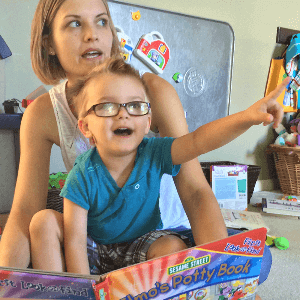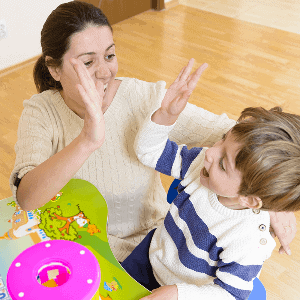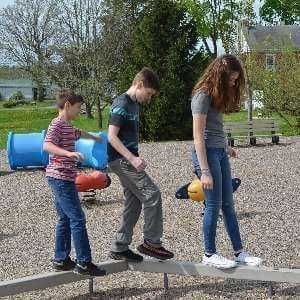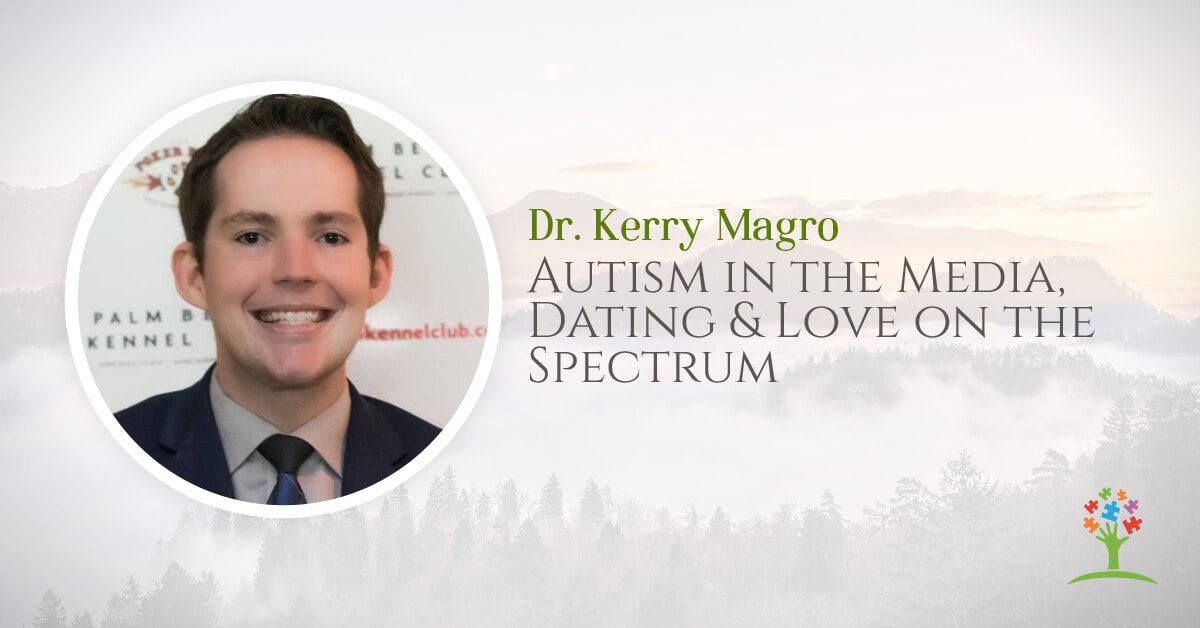
With a diagnosis of PDD NOS, as a child, Kerry was labeled a “low-functioning” autistic child. But today he has a Ph.D. in education and is a public speaker, consultant, and self-advocate across a variety of social media channels. For Kerry, using the labels of “high-functioning” and “low-functioning” ignores the different characteristics and strengths that are inside every child with autism. He shares why he prefers to think of autism as a color wheel instead of a spectrum.
Both Kerry and I enjoy the show Love on the Spectrum, which follows adults with autism who are searching for love in Australia. I appreciate the realistic and hopeful message of the show, and Kerry hopes that it comes to America.
Some of Kerry’s YouTube videos have been viewed 35 million times, and he uses his platform to share his message of inclusion and hope. A lot of Kerry’s work is centered around the idea that representation of autism in the media matters. The media’s portrayal of people with autism has changed over the years to become more diverse, but still, less than one percent of disabled characters are played by disabled actors. It’s Kerry’s hope that we not only continue to include more voices but that we also have disabled actors portray those voices.
TODAY’S GUEST
Dr. Kerry Magro is an award-winning professional speaker, best-selling author, and autism consultant to the HBO series Mrs. Fletcher that aired last Fall. He started professional speaking 9 years ago via the National Speakers Association and has spoken at over 900 events during that time. In addition, Kerry is the CEO & President of KRM Making A Difference, a nonprofit organization that hosts inclusion events and has provided 68 scholarships for students with autism for college. In his spare time, he hosts a Facebook Page called Kerry’s Autism journey that now has 202,000 Facebook followers where he does on-camera interviews highlighting people impacted by a diagnosis to break-down barriers in our community. His videos have been watched over 35 million times.
Kerry’s best-selling books Defining Autism From the Heart and Autism and Falling in Love have reached Amazon Best-Seller Lists for Special Needs Parenting. He is based in Hoboken, New Jersey, and can be contacted about collaborations at [email protected].
— Kerry’s Autism Journey on Facebook
— Kerry Magro on Twitter
— Kerry Magro on Instagram
— Kerry’s Autism Journey on Youtube
— Kerry Magro’s Website
YOU’LL LEARN
- Instead of using labels to describe autism, Kerry shares why he prefers using a color wheel.
- Why Kerry thinks diversity matters when portraying autism in TV and movies.
- How the Australian TV show Love on the Spectrum is changing the perception of autism in the media.
Attend a FREE Workshop!
RESOURCES
— MaryBarbera.com/workshop(Sign up for a free workshop online for parents and professionals)
— #004: Is it High Functioning or Low Functioning Autism?
— High Functioning Autism vs. Low Functioning Autism: Is There a Difference?
— Acting Antics by Cindy Schneider
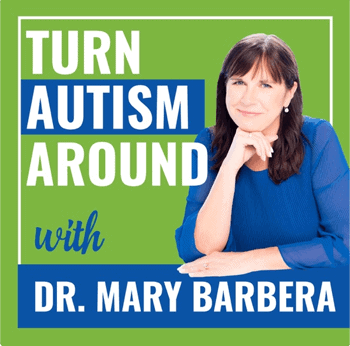
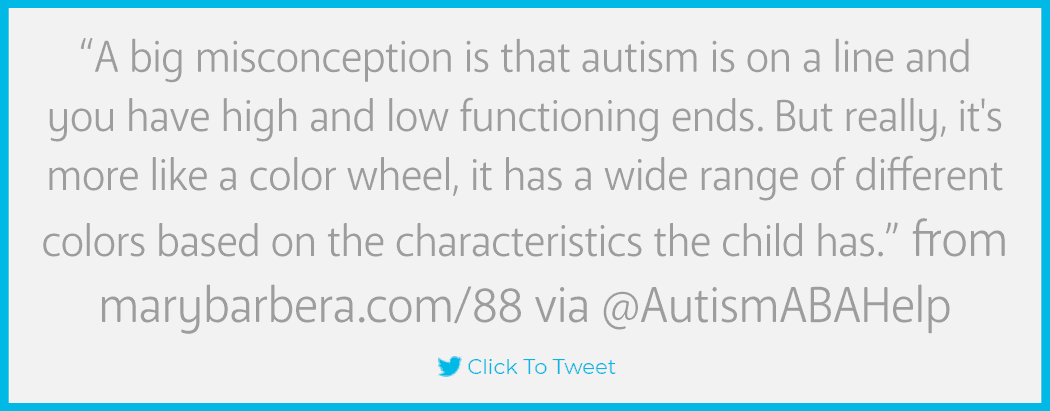
Transcript for Podcast Episode: 088
Autism in the Media, Dating & Love On the Spectrum | Interview with Dr. Kerry Magro
Hosted by: Dr. Mary Barbera
Mary: You're listening to The Turn Autism Around podcast episode number 88. Today, I have a special guest, Dr. Kerry Magro, who is a person with autism. He is a self-advocate. He has his doctorate in education. He's an award-winning author and professional speaker. He is also a consultant to the media to make sure that autism is portrayed correctly on various shows. So today we are diving into all of that, the spectrum, whether we should be using terms like high functioning, low functioning. We're talking about dating and finding love on the spectrum and all sorts of things that I'm sure will be of interest to you. So let's get to this special interview with Dr. KerryMagro.
Mary: OK, so, Kerry, it is such a pleasure to meet you. Thank you so much for coming on the show.
Dr. Kerry Magro: Happy to be here.
Mary: Yeah, I've been following your work for years, actually. So it was great that we could plan some time to get together. I always start with the same question for interviews. Describe your fall into the autism world. And since you're a person already with autism. When did you know you had autism and when were you diagnosed and when did you find out?
Dr. Kerry Magro: Yes. So I was diagnosed with autism when I was four. But I didn't know I had autism until I was eleven and a half. I was in a social skills class and we were playing disability celebrity bingo. And we were learning about all these celebrities who had a disability. And I just got curious right after that because the teacher says, oh, all these individuals are special, just like you. And I didn't know why I was special. So after school that day, I asked my parents and they told me that I had pervasive developmental disorder and otherwise specified.
Dr. Kerry Magro: And Mary, let me tell you, it was life changing after so many years of knowing I was special from going to different therapy appointments to finally having just the ability to go research autism afterwards, to learn about autism being a social and communication challenge for some really opened my eyes and made me want to become a self-advocate. Even as an eleven-and-a-half-year-old child. So that's kind of how I was introduced originally and I kind of just went from there.
Mary: Did you ever ask your parents why they didn't bring it up before that or give it a name?
Dr. Kerry Magro: Yeah. You know, they always knew that I knew that I was special. So I think that was a big reason why it really never came up in terms of mentioning the autism definition. We didn't have any friends who had a child with autism either. So it really wasn't a topic that really came up that often. So honestly, when it was just introduced to me, I was just like, oh, OK. And then I wanted to learn.
Mary: And you're in your thirties, right?
Dr. Kerry Magro: Twenty-one plus eleven.
Mary: So you're in your early thirties. And so this was a while ago, before autism was like a household word really.
Dr. Kerry Magro: Yeah, it was during the realm of Rain Man. Everyone thought people with autism were boys. All of them had photogenic memories, all of them would win you a lot of money in the blackjack tables. That was pretty much autism in the early 90s and far less diagnosed than it is today.
Mary: Back then when you were diagnosed, it was like one in a thousand. And now it's one in 50 ish. And so when Lucas was diagnosed in nineteen ninety nine, it was one in five hundred. And it's funny because I just did a few weeks ago I did a podcast interview with my typically developing son, Spencer, who is in med school now. And you know, it wasn't like I had to tell Lucas he had autism because he didn't have and he still doesn't have the cognitive ability to even comprehend things like that. But when Spencer was like three, I was thinking, well, should I sit Spencer down and tell him that Lucas has autism and label it?
Mary: And that sort of thing. And my babysitter was like, oh, yeah, he already knows. He already uses the word. But I founded the Autism Society in my county. And autism was a word that we used a lot. Lucas had ABA therapy and so it was much more used. But do you get questions from parents about how to tell their kids or tell the siblings that autism is the diagnosis?
Dr. Kerry Magro: All the time because there's really not a lot of research on that in terms of books. You see a lot of books from therapists, you see a lot of experts, parents, self-advocates. But you really don't get a huge perspective of how to go about telling about that initial diagnosis. So usually my advice to parents is to consider it similar to early intervention. Try to tell them as soon as possible, because I get a lot of pushback when I say that from some parents, because they say, well, I don't want my child to be labeled, to feel like they live by a label. But they're going to be Kerry Magros in the world who are going to go for years with uncertainty of why they're special.
Dr. Kerry Magro: And, you know, I often say that was life changing when I was eleven and a half when I learned. So go in stride and just make it very simple. My parents said two sentences. They said, Kerry, you have autism. This is TBD NOS but it doesn't make you any less our son. So I was like cool. I had no idea what that meant. I was like, all right. That's the easy way of just introducing the word. And then if they feel discouraged later on about their diagnosis. Talk about self-advocates in the community like the Temple Granites of the world, to show them that there are people out there who are really doing great things.
Mary: Yeah, I think it does depend on the child, the family. You know, the PDD NOS diagnosis is something that starting in 2013 with the DSM-5 is no longer a diagnosis, PDD NOS. And actually Asperger syndrome both went out the window and now everything is autism spectrum disorder. So let's talk about the spectrum. And, you know, I have done a podcast on high functioning versus low functioning autism in the past. That's episode number four. I've also done a lot of writing about you give a teacher six or eight kids in our class and that's an autism classroom and you say, line your kids up in terms of who's highest functioning, who's lowest functioning.
Mary: It's going to be an impossible task because within each child is a unique set of skills and deficits and challenges to overcome. And those challenges. I mean, kids can change. Kids can look high functioning like Lucas looked pretty high functioning when he was two and going to typical preschool by himself and had some words and was kind of warm and affectionate with us. So things can really change. So I'd love your thoughts about high functioning versus low functioning and the spectrum.
Dr. Kerry Magro: Yeah, one of the biggest misconceptions is that autism is on a line and you have the low functioning end right here. Then you have the high functioning end right here. When really autism, I like to consider the color wheel. It has a lot of wide ranges of different colors based on the characteristics that your child has. When I was a kid, my two things was I can speak to those three. I speak complete sentences, tall seven. But I was such a good visual learner that I was able to understand things way quicker than most of my peers. So I wish as a society we would stop using these, quote unquote, autism functioning labels, because at the end of the day, they do more harm than good, I think, in our New Year. I think we really want to expand our community and get these kids to to help them raise barriers in their own local communities.
Dr. Kerry Magro: It really comes down to just seeing an individual as a person who has her own unique strengths and challenges and really meet them where they are in the hopes of giving them the best therapy possible. Because that's another big thing. I see a lot of people calling these individuals low-functioning and saying, well, they need ABA and they need occupational therapy and they kind of don't need to look at speech therapy as a possible avenue because they're like, oh, that child will always be low-functioning. And that's the kind of area where experts really, really need to just establish that rapport to find the best therapies to help them live the best quality of life possible.
Mary: So were you considered at some points of your life to be low functioning?
Dr. Kerry Magro: Yes. It took about 18 months to get formal diagnosis and PDD NOS, so during that time between 2 1/2 and 4 experts were saying that I was on the severe end. I would be lucky to graduate from high school one day. Now, speaking to you as a doctorate in education, it was so alarming for my parents to hear that from conversations I've had with them even to this day about when I was very, very young. So, yeah, it was it was really, really hard for my parents to hear that. And that's another reason why I wish we would kind of get away from those labels too.
Mary: Yeah. And there's always hope. And the earlier you intervene and help parents, regardless of a diagnosis, because the waiting lists are just atrocious. And that's going to be the whole premise of my new book, which is going to be out in April, of getting really parents of very young children who are just showing signs of autism to help them right away. Kind of repair that parent child dyad so that they don't lose out on all those opportunities for growth and for improvement.
Mary: So you have a doctorate in education. So, you know, you described when you found out you were on the spectrum to when you were 11 and a half, you were on a social skills group. So were you mainly in kind of special education or were you mostly, included in general education throughout your early and later, and then how did you make it to college?
Dr. Kerry Magro: I went to, so special education was still very up and coming in my area in the early 90s, so I actually went to five different public schools within K through just going into middle school. So I was always in, I went from special education from K to four and then from four to five I was in a mainstream classroom. I was in an inclusion classroom, and I was a victim of bullying and had a lot of challenges trying to fit in with my peers, which is one of the leading epidemics I think we have in the schools today. And then I went from middle school to high school in a special ed program at a district for Kids with Learning Disabilities.
Dr. Kerry Magro: And that's where I saw most of my progress. That's when I learned about my diagnosis and it really helped. One of the biggest things that helped was the student teacher ratio went from twenty-five to one, an average to eight to one on average. So lot more hands on with the teachers. And I think that was one of the big things, along with finding my key interests really, really propelled me to going to college at Steam Hall. Receiving my undergraduate and master's from there and then receiving my doctorate last night in educational technology leadership from New Jersey State University.
Mary: Nice. And so what is your position now like? What do you do for a living?
Dr. Kerry Magro: So my full time work is in public speaking. So about nine years ago, I partnered with a group called the National Speakers Association who are speaker bureau. And they actually gave me a scholarship to pursue my master's in strategic communications. So it led me down to a career in public speaking. I received a student membership with them for a few years before going as a full-time speaker, which I've been doing Full-Time for about three and a half years now, even though I've been speaking as part of that program for the past nine. So that's my main job.
Dr. Kerry Magro: And then on the side, I've read three books, Defining Autism from the Heart, Autism and Falling in Love. And my first children's book, I Will Light Up Blue. In addition to consulting, I do a lot of work as an autism entertainment consultant to bring a realistic picture of autism to our entertainment industry as a nonprofit founder and also as a mentor to many individuals with disabilities. I said I wear many hats and that's why I love talking.
Mary: It sounds like you are really busy. Yeah. Well, let's talk about the media consulting position that you have. And I know a lot of my listeners are parents and professionals of kids who have more significant challenges, who are diagnosed with moderate to severe autism, who are not conversational, although I mean, we also all of these techniques work for even typically developing kids. And so I totally agree with the whole spectrum thing. But a lot of people do find me because of my first book, the verbal behavior approach, which really teaches kids, teachers, parents and professionals how to teach language.
Mary: But, you know, some of the people in in my circles believe that media is actually highlighting people on the high end of the spectrum who are quirky, who are becoming doctors, who are, you know, it's like people say, oh, that's like 0.1% of the population. Meanwhile we're struggling. And then sometimes self-advocates can be like, we want all these rights and we don't want restrictive placements and all kinds of things. But like in terms of media portrayals, how do you respond to not having severely affected kids and adults in movies and TV shows on average?
Dr. Kerry Magro: Yeah, it's really a problem because it feels like we have gone back to the Rain Main autism being seen as savants. And we really need to expand this, because one of the big things that I've done is in the three projects I've worked on, Joyful Noise had a teenager who was black, who was on the autism spectrum. We have not seen really any portrayals of individuals who are black in the autism community. My second film, Jane Wants a Boyfriend focused on a girl, 25, who is on the autism spectrum trying to find love. And before Sesame Street's Julia, which was the first Muppet with autism, we really didn't have a lot of girl representation in the media.
Dr. Kerry Magro: And then my last project, which just aired last fall, HBO's Mrs. Fletcher actually had a non-verbal child. A five-year-old non-verbal child who is on the autism spectrum as one of their characters. And I think that's really important. As I continue to pick projects to work on that, I really focus on the importance of diversity, because for each one of those on a lower scale, the big ones that we continue this year is the good doctor, which Sean Murphy savant, BoJack memory. We see Sam Gardner on Atypical where, you know, really, really smart white individuals who are very high functioning, if we have to use the functioning label.
Dr. Kerry Magro: And it's really, really important that as a society, we make sure that if we really want to be representing this community in the best way possible, that we try to include as many voices as possible, because at the other end of it, in terms of disability representation, the Ruderman Family Foundation came out with a study a few years ago saying that less than one percent of disabled characters, disabled actors, actually play the roles of disabled characters on television. So it's really important from the two pronged approach, not only making sure we include more voices, but we're actually having disabled actors portray those voices.
Mary: And I think that's great. And I know my typically developing son, Spencer, was very heavily involved with theater, musical theater all throughout his childhood. And I know that a lot of higher functioning autistic people are also very involved with theater. And Cindy Schneider, I think, is their name. She wrote a book called Acting Antics, which is basically social skills, theater games and social skills. It's a magnificent book. We can link it in the show notes and we're going to link all three of your books, Kerry, in the show notes as well. And we can link some of those HBO, you know, the HBO Mrs. Fletcher, and Atypical and those sorts of things to just in terms of if people aren't aware. I've never heard of Mrs. Fletcher. So when you go in as a consultant, what exactly do you do to help them portray autism differently?
Dr. Kerry Magro: So I actually come from a theater background throughout high school. So one of the therapies that helped me tremendously growing up was theater therapy because I had mind blindness. I really didn't understand the perspectives of others that well. And it really helped me to once I decided to come out about having autism because, and to this day, I still have a quote unquote, physical disability. People don't realize I'm on the autism spectrum. So a lot of the times I really as an autistic advocate, I started talking more and more about my civic diagnosis to break down barriers for individuals within physical disabilities.
Dr. Kerry Magro: And once I go on to a project, once I start to talk about theater therapy and autism, I started getting asked to be on specific movies and specific TV shows. And what I do is I review this script to make sure that the dialog between the characters is as realistic as possible. In some cases, I even helped to cast the characters that actually played those roles and also shadowed the characters to make sure that they were really portraying characteristics we see in the autism community. Not only the characteristics that are more commonly known, such as stimming and the difficulties with eye contact in some characters, but then also just talking about relatable topics that are impacting our autism community today.
Mary: Yeah, I think it's fascinating and I know you were posting about a new Netflix show called Love on the Spectrum, and I happen to be a big fan of reality dating shows. It's kind of like one of the things that surprises people. So I binge watched the Love On the Spectrum, which is only five episodes this past weekend. And I loved it. It was really good. So you've obviously watched it. You've been on some new shows about Love On Spectrum. So let's just talk about that for a minute. So that show was recorded and filmed in in Australia. Is that planning to come to the United States as a version or do you know?
Dr. Kerry Magro: They're really hoping. I've been talking with the producers of Love on the Spectrum since 2019 since they signed their partnership with Netflix to make it a Netflix original series. So I think that is certainly something they want to look at. It's received critical acclaim since it came out in the middle of July, I believe. So I definitely think a United States version would be a great next step, because I know there's been a lot of interest from many self-advocates who are dating who are on the autism spectrum today. I am still single, so I have had several girlfriends in the past and I'm definitely looking for love on the spectrum. So I definitely have advocated as somebody who would love to potentially be on the show in the future, but also to help bring on different individuals on it as well.
Mary: Yeah. So your book is called Autism and Falling in Love. So what's that book about?
Dr. Kerry Magro: So the book is about dating. So when I was 18, I had no idea how to talk to girls. And now one of the biggest things my mentees want to talk about is they don't want to talk about mock interviews online, talk about how to write a resume. They want to talk about the cute boy and cute girl and how they can approach themselves in the right way to potentially go on dates and potentially get into relationships. So I wrote a book based on the one that got away heartbreak I've had in my life. But then also the second half of the book is Focus on Dating Tips. And I've learned from dating for over a decade on the autism spectrum to help some of my mentees and also to help anyone who's trying to become the best version of themselves or a potential partner.
Mary: So have you only dated people or women that are on the spectrum?
Dr. Kerry Magro: I have actually not dated any girls who are on the autism spectrum. Although I'm open to the opportunity if it presented itself.
Mary: So I know Steven Shore in his books and I've seen him present. I've presented at conferences at the same time as Steven Shore and I just interested in your take on this. He has married a woman from Asia, I believe. And he says that he felt that somebody from a different country who spoke a different language as their first language, he found to be more open and less picky about like social nuances and that sort of thing.
Dr. Kerry Magro: Have you ever heard that or do you agree with that from speaking in different countries and in different continents, I've noticed obvious cultural differences and many in those areas. So there's certainly something to what he's saying. I love Steven. Steven's my big brother. I call him. We're on Facebook Messenger, like almost on a weekly basis, being him from New York and me from Hoboken New Jersey. I'm hoping to become a college professor in my spare time, a part time professor. So he works at a place. So that would be supportive towards the teacher, too. So there's certainly something there, though. Yeah.
Mary: Yeah. He wrote a book where he detailed that and he recommended that. But yeah, that's a really interesting and looking at love on the spectrum. Do you think that show was well portrayed?
Dr. Kerry Magro: I think so. I think the one caveat that I'm hearing from a lot of self-advocates is the unfortunate. Well, spoiler alert. So if anyone here says don't fast forward for the next few minutes interview, but at the end, the couples stay together. But none of the individuals actually found relationships. So I know there was a little disturbing to some self-advocates in our autism community, but I've always looked as if glass half-full. Just seeing these individuals, seeing the relationship coaches that were actually helping them was tremendous to give advice as a positive in our community. So I thought it was portrayed pretty well. And I commend the producers for doing the job well done.
Mary: I just think they should have tried to pair up Michael and Maddie and closed with that play. Put those two together. Let's see how it works. And one of the things I really loved about love on the spectrum was the families. They were so supportive of their adult children and it just warmed my heart. So I would recommend you watch that. And I'm sure it'll still be out by the time this airs. OK. So let's pivot a little bit where, you know, just going to wrap up soon. But since we're still in the middle of the COVID pandemic, you know, I know a lot of parents and professionals.
Mary: I'm sure you as a professional speaker were very much impacted by the COVID shutdown of everywhere where you were speaking or going virtual, which, you know, is one way to do it. But I know of a lot of families are struggling. Schools shut down, some virtual, you know, parents working. Anything you want to throw out about COVID and whether it's your personal situation or things you're hearing from people who are asking you questions.
Dr. Kerry Magro: Yeah, absolutely, I think one of the biggest things we really need to do right now is just make sure that we're talking about mental health at these times, because I hate in the media when I see somebody talking about social distancing, because not only as an autism advocate, but also as amental health advocate and someone who's dealt with emotional challenges in his life. I wish we could change the narrative from social distancing to physical distancing. Because at a time like this where people can feel so isolated, especially with the numbers being so uncertain, where we're not really sure when this will end, when we will see a vaccine in the future.
Dr. Kerry Magro: So we really need to do a good job of making sure to have daily mental health check ins with our loved ones and having that open communication, because at the end of the day, so many of our loved ones think literally. So the importance of really having that open dialog can't be overstated, especially at a time like this.
Mary: Yeah, especially somebody posted, I asked, what are your biggest struggles since the shutdown? This was a while ago. And somebody said, you know, my student keeps saying, well, when's it gonna be over? When are we going to get it? And it's like, I'm with this kid, like, you know, and I'm a typical adult. And it's like kids that are on the spectrum that have some understanding but don't have a ton of understand. I have one family that I know that, you know, she thought like everybody else was going to school, but she wasn't. And everybody else was going to a youth group at church for she wasn't.
Mary: And like Mom literally, like drove her to school, showed her school busses are all locked up. There's nobody at school. Some kids may need more direct teaching about what is happening and more dialog about it. And I also heard physical distancing, but virtually close. And so utilize Zooms and face times and not just texting because you can't really tell a lot what's going on with people's texts and emails. And so I love the Face-To-Face component of getting to know people and trying to stay as positive as possible.
Mary: I liked something you said, look at the glass half full and be thankful that we're still all here and we're going to just try to do our part to make this go away as quickly as possible and whatever that looks like. And there are a lot of unknowns, but there's a lot of unknowns with life as well. So, OK, so before we, and first of all, I want to know how people can follow your work. Do you have a Web site?
Dr. Kerry Magro: Yeah, sure. So my Web site is just my name. KerryMagro.com. You can also follow me on Facebook at Kerry's Autism Journey. One of the cool things we do is we have a video series where pre-COVID we sat down with self-advocates for 10 to fifteen minutes at a time and we did these little self-advocate interviews with people impacted by a diagnosis in the hopes of promoting neurodiversity. So all our entire special community, we call it video series is on my Facebook page, but also on my YouTube page at Kerry's Autism Journey. And then you could follow me on Instagram and Twitter at Kerry Magro.
Mary: OK. So it's Kerry Magro and it's M-A-G-R-O. And the Kerry is K-E-R-R-Y. So KerryMagro.com. We're gonna be excited to see your work. Hopefully you'll get Autism On the Spectrum right here in the United States and be a media consultant there. Or maybe you could be one of the experts that gives people tips. I think that would be awesome. Whether or not you're a contestant or not. But I'll be watching and I'll be following you for years to come, I'm sure. So just to wrap it up, part of my podcast goals are for parents and professionals to be less stressed and also self-advocates that are listening to be less stressed and lead happier lives. It's not just about helping our kids, but it's also about we only have one life and we want to make it the happiest we can. So do you have any stress reduction tips or things that make you happier?
Dr. Kerry Magro: Things that make me happier really begin with staying very close to my family. Even before COVID-19, really just making sure that I tried to. Because in times where I feel like I had eight jobs. It's always important for me to just take a few meds and to reflect on everything going on to spend time with loved ones. I feel like sometimes that could all through the cracks. I'm also a big component of physical activity and really good nutrition. Thirty minutes of walking every single day. Really important to short-term and long-term retention, but also getting that positive energy from those specific workouts because obesity is still one of the biggest challenges. And then also it leaves still a lot of stress and anxiety in our community.
Mary: I think that's great. All right. Well, I really appreciate your time today. Kerry, it's been a real pleasure to get to know you better. And I'm sure my listeners out there will love hearing from you. So we'll be following your work. KerryMagro.com. You have a book coming out next April as well as my book. So we'll be doing our book tours. Hopefully they won't be all just virtual, but who knows? I mean, that's one way to get the word out. So keep spreading the word and look forward to seeing you what you do in the future.
Dr. Kerry Magro: And vice versa.
Sign up to receive email updates
Enter your name and email address below and I'll send you periodic updates about the podcast.

